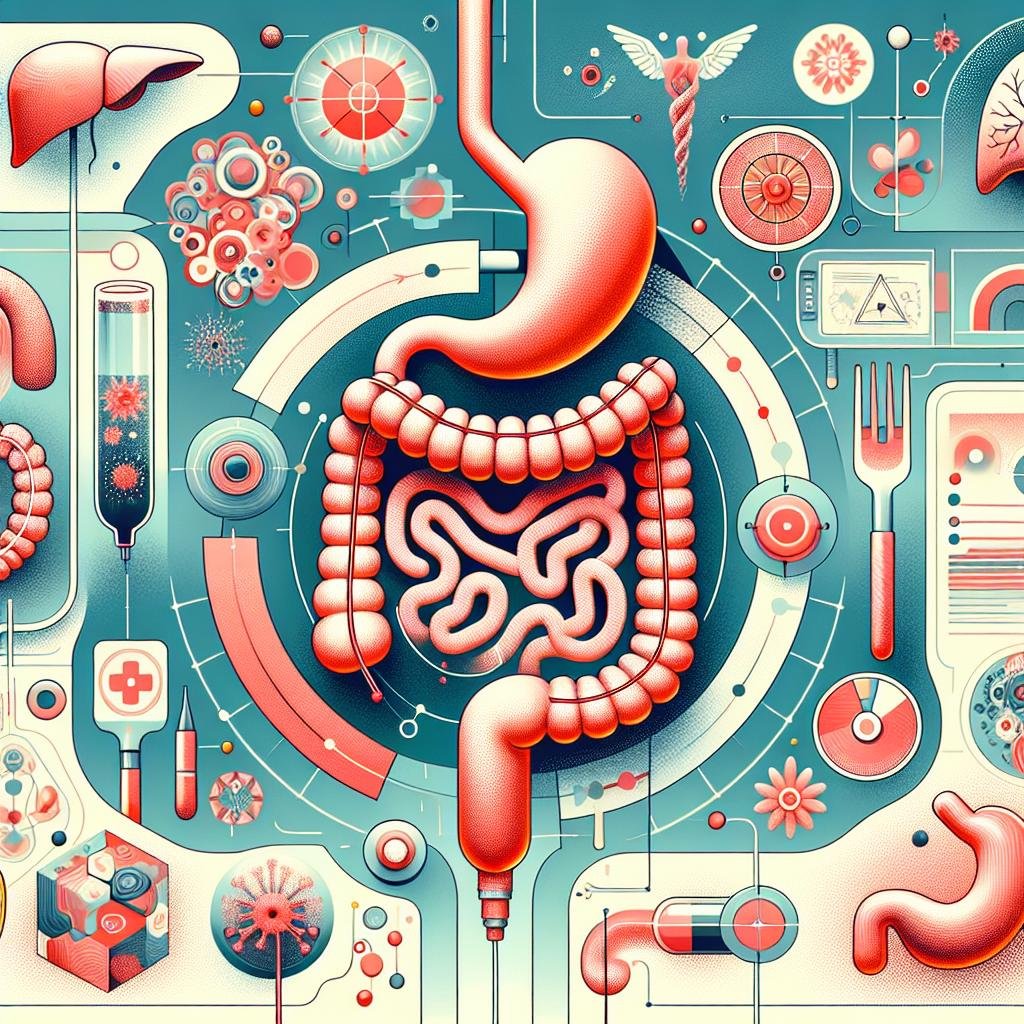In a world increasingly captivated by wellness trends and holistic health approaches, intermittent fasting has emerged as a popular practice, drawing attention not only for its potential benefits on weight management but also for its effects on various bodily systems, particularly the digestive tract. This dietary pattern, characterized by cycling between periods of eating and fasting, raises intriguing questions about its influence on digestive disorders, including the persistent and often debilitating condition known as Irritable Bowel Syndrome (IBS). As millions grapple with the daily challenges posed by digestive issues, understanding the interplay between intermittent fasting and gut health becomes not just a matter of curiosity, but a key to unlocking new avenues for relief and well-being. In this article, we will explore the latest research and insights into how intermittent fasting may shape the experiences of those living with digestive disorders and IBS, providing a comprehensive overview of both its promise and its limitations.
Exploring Intermittent Fasting as a Dietary Strategy for Digestive Health
Intermittent fasting (IF) has emerged as a fascinating approach to enhance digestive health, particularly for individuals grappling with digestive disorders and conditions like irritable bowel syndrome (IBS). By adopting a structured eating pattern, IF allows the digestive system to rest during fasting periods, potentially alleviating symptoms such as bloating, gas, and abdominal pain. The strategy hinges on the idea that when the body is given adequate time to repair and rejuvenate during a fasting phase, inflammation can reduce, and gut flora can rebalance, promoting overall well-being. Some of the reported benefits include:
- Reduced Inflammation: Fasting may lower levels of pro-inflammatory markers.
- Enhanced Gut Motility: The timing of meals can contribute to regular and efficient bowel movements.
- Improved Microbiome Diversity: Intermittent fasting can positively influence gut bacteria.
Furthermore, certain studies suggest that individuals following an intermittent fasting regimen experience fewer IBS flare-ups compared to those on traditional eating schedules. This might be attributed to the restriction of food intake to specific windows, which could potentially minimize the likelihood of triggering certain food sensitivities. While research is still ongoing, preliminary findings are encouraging and highlight the need for a deeper investigation into personal dietary responses. Key elements of intermittent fasting that can support digestive health include:
| Fasting Type | Eating Window | Potential Digestive Benefits |
|---|---|---|
| 16/8 Method | 8 hours | Encourages regular digestion, reduces bloating |
| 5:2 Diet | 500-600 calorie days | Reduces overall caloric intake, supports gut health |
| Eat-Stop-Eat | 24 hours | Rest for gut, potential for better absorption |

The Connection Between Intermittent Fasting and Irritable Bowel Syndrome Symptom Relief
Emerging research highlights a potential relationship between intermittent fasting and symptom relief for individuals suffering from irritable bowel syndrome (IBS). This dietary approach, characterized by cycles of eating and fasting, may help coordinate and stabilize gut microbiota, which can be particularly beneficial for those with IBS. By reducing the frequency of meals, intermittent fasting can lessen the overall workload on the digestive system, thereby minimizing the risk of overactive bowel responses. Some individuals report a decrease in symptoms such as bloating, cramping, and irregular bowel movements, suggesting that the structured eating patterns of intermittent fasting may contribute to improved digestive health.
Moreover, intermittent fasting has been associated with various metabolic benefits that can indirectly affect IBS symptoms. Such benefits include:
- Enhanced gut permeability: Fasting may improve the tight junctions in the gut lining, reducing inflammation and irritation.
- Weight management: For some IBS sufferers, excess weight can exacerbate symptoms, and intermittent fasting may aid in achieving a healthier body weight.
- Reduced inflammation: Studies suggest that fasting can lower inflammatory markers, which may play a key role in alleviating symptoms.
while intermittent fasting is not a one-size-fits-all solution, many people managing IBS find it to be a valuable part of their wellness strategy. Exploring various fasting protocols can uncover individualized approaches that enhance comfort and overall gastrointestinal health.

The Science Behind Gut Microbiome Changes During Intermittent Fasting
The gut microbiome is an intricate ecosystem of trillions of microorganisms that play a vital role in our health. Recent studies indicate that intermittent fasting (IF) can lead to significant shifts in the composition and diversity of gut bacteria. During fasting periods, the absence of food encourages the growth of beneficial bacteria while inhibiting the proliferation of harmful species. This shift not only promotes a balanced microbiome but also enhances the gut’s ability to process nutrients efficiently and protect against inflammation. Key factors influencing microbiome changes with intermittent fasting include:
- Shortened feeding windows: Limiting the time available for eating might reduce the amount of unhealthy food intake, allowing beneficial bacteria to flourish.
- Autophagy: During fasting, the body initiates autophagy, a process that recycles damaged cells, potentially supporting gut health.
- Increased microbial diversity: A broader range of gut bacteria can improve overall gut function and resilience.
Additionally, the metabolic changes induced by intermittent fasting may have a cascading effect on the gut-brain axis, influencing mood and stress levels, which also play a role in gut health. For individuals with digestive disorders or Irritable Bowel Syndrome (IBS), these alterations in gut microbiome composition can lead to sustained improvements in symptoms like bloating and irregular bowel movements. Notably, recent research highlights a correlation between fasting and the reduction of specific IBS symptoms, underlining how fostering a healthy microbiome can impact gastrointestinal disorders. Consider this simplified comparison of gut microbiome variations pre- and post-fasting:
| Microbiome Status | Pre-Intermittent Fasting | Post-Intermittent Fasting |
|---|---|---|
| Microbial Diversity | Low | High |
| Beneficial Bacteria | Reduced | Increased |
| Harmful Bacteria | Present | Reduced |

Practical Guidelines for Implementing Intermittent Fasting in Digestive Disorder Management
When considering intermittent fasting as a strategy for managing digestive disorders, it is essential to begin with a clear understanding of individual needs and health conditions. Here are some practical tips to help integrate this approach effectively:
- Consult with a Healthcare Professional: Always engage with a doctor or nutritionist to ensure fasting aligns with specific digestive needs.
- Start Gradually: Begin with shorter fasting periods, such as 12 hours, before progressing to more extended durations. Observing how your body reacts can be invaluable.
- Track Symptoms: Maintain a food diary to note patterns in symptoms related to both diet and fasting periods, enabling more informed adjustments.
- Stay Hydrated: Hydration plays a crucial role in digestion; ensure you consume adequate fluids during fasting windows.
Incorporating intermittent fasting may require adjustments in meal planning and composition. It is beneficial to focus on nutrient-dense foods during eating periods to maximize health benefits. Consider these approaches:
| Meal Component | Recommended Options |
|---|---|
| Protein | Lean meats, legumes, tofu |
| Fiber | Whole grains, fruits, vegetables |
| Healthy Fats | Nuts, seeds, avocados |
By being mindful of these strategies, individuals can better navigate the complexities of intermittent fasting while considering the intricacies of their digestive health.
Closing Remarks
the journey through the realms of intermittent fasting and its effects on digestive disorders and irritable bowel syndrome is one that invites both curiosity and caution. While many anecdotal narratives highlight the potential benefits of time-restricted eating, the scientific landscape remains complex and evolving. Each individual’s digestive system is unique, influenced by a tapestry of genetics, lifestyle, and pre-existing conditions. Therefore, as we continue to explore the intricate relationship between intermittent fasting and digestive health, it remains essential to approach these practices with personalized care. Whether it serves as a beacon of hope or a cautionary tale, the impact of intermittent fasting on digestive disorders offers a compelling chapter in the broader narrative of health and wellness. As we look to the future, ongoing research will undoubtedly illuminate new pathways, guiding us toward a deeper understanding of how we can harmonize our eating habits with our body’s needs. Until then, the dialogue around this multifaceted topic continues, inviting us all to listen closely to the wisdom of our own bodies.

